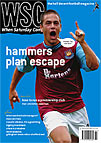 The intense rivalry between Rangers and Celtic is about more than just football. But Ken Gall feels not enough is being done to turn focus back to the pitch
The intense rivalry between Rangers and Celtic is about more than just football. But Ken Gall feels not enough is being done to turn focus back to the pitch
In December, as part of a wider package of measures aimed at ending sectarian behaviour in Scotland, First Minister Jack McConnell announced a campaign to end bigotry at Old Firm games. This might prompt the cynical to speculate as to what his next project might be – the prevention of night following day, perhaps.
To many, a trip to an Old Firm game is like a glimpse into a world unknown: street vendors selling UVF and IRA material; songs about the Battle of the Boyne and the martyrs of Ould Ireland; threats, mayhem and intimidation (the last of which usually occur also on the pitch). The Old Firm-specific proposals centred around a ban on vendors of paramilitary goodies and a more robust regime for prosecuting fans who sport such items or indulge in bigoted behaviour. But, as part of the Scottish Labour establishment, McConnell knows that it does not do to potentially alienate thousands of west-of-Scotland voters. And so, ever-so-subtly, he began to move to a position in which the clubs themselves would not be held responsible in any way for the darker elements of their respective supports.
While voicing concerns about the sale of Loyalist and Republican knick-knacks, he said that there were no plans to ban the Union flag from Ibrox or the tricolour from Celtic Park. Somehow, bigotry and sectarianism can be done away with while maintaining two of the most inflammatory symbols of each. With an apparently straight face, the First Minister remarked that flying the flags was part of the “strong and proud traditions” of each club.
The First Minister’s statement – preceding December’s Old Firm game – led to an all-too-predictable conclusion: the hardcore from both sides were roused to defend their rank-rotten traditions, as anyone tuning into the BBC’s coverage could attest. While Gary Lineker swooned like Unity Mitford at a Nuremberg rally, thousands of people could be heard undermining McConnell’s dream of a tolerant Caledonian utopia by threatening mass religious violence on nationwide television.
The moderator of the general assembly of the Church of Scotland – a source all too rarely quoted in WSC – welcomed the “clear lead” being shown by the First Minister. However, clarity did not seem to be the watchword of the policy. McConnell had earlier commended police officers for seizing Unionist emblems at a Hearts v Celtic match. But surely it can be argued that a flag bearing the red hand of Ulster is a “symbol of Britishness”, which forms part of the “great traditions” of Glasgow Rangers? And why did the police feel confident enough to do a job at Tynecastle that they might have shied away from at Ibrox?
Next, a leading Scottish QC questioned the legal workability of any proposal to ban flags. Alas, the silk in question turned out to be former Rangers vice-chairman Donald Findlay, who was forced to resign from the Ibrox board after being filmed singing a sectarian song.
It is now taken for granted in the Scottish sporting press that the clubs are genuinely attempting to eradicate sectarianism, and Rangers’ apparently seamless acceptance of numerous Roman Catholic players would seem to confirm this. But how can they explain their choice of an orange away strip for this season, which showed an apparent willingness to exploit the very tendencies to whose abolition both clubs pay lip service? (The claim from some Ibrox ultras that Celtic’s choice of a yellow away strip was a tribute to the Vatican shows the level at which the debate is usually held.)
There is a genuinely radical alternative, which Mr McConnell may like to consider. If displays of support for terrorism/paramilitaries continue, allow the police to authorise the closure of Ibrox and Parkhead for a specified number of games. If that does not do the trick, the SPL should be encouraged to dock points come the end of the season.
One can anticipate that a series of large fines or the potential loss of a league title just might provide the clubs with the impetus to act. Otherwise, one might begin to wonder whether both were happy to see the hatred and antagonism of their large and lucrative supports continue, and that would never do.
From WSC 192 February 2003. What was happening this month